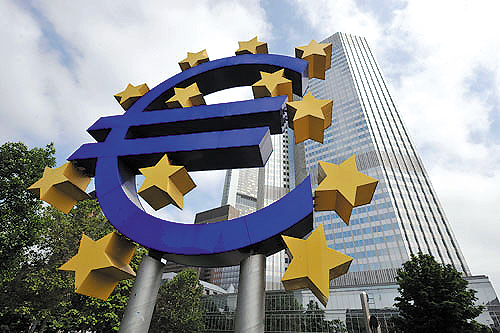 周三,欧元出现大幅贬值,欧元价几乎达到近3个月以来的新低。这与时下希腊政局不稳大有关系;同时,有关法国政权更迭可能破坏经济紧缩计划的担忧更加速了欧元的贬值,这一计划原本旨在处理欧元区的债务危机。
周三,欧元出现大幅贬值,欧元价几乎达到近3个月以来的新低。这与时下希腊政局不稳大有关系;同时,有关法国政权更迭可能破坏经济紧缩计划的担忧更加速了欧元的贬值,这一计划原本旨在处理欧元区的债务危机。
周二,希腊左翼政党称希腊对欧盟和国际货币基金组织关于经济救援的承诺已变成一纸空文,紧接着欧元就开始面临贬值的压力。
希腊支持救援计划的两个主要政党在上周末的大选上铩羽而归,这给该国能否顺利渡过破产危机、继续留在欧元区留下悬念。
货币价值对投资者的风险偏好非常敏感,新西兰元就因为投资者偏好的改变一下子跌到4个月以来的最低点。
“其中有一个问题需要搞清楚,即这种现象是否会导致全球投资者躲避风险,还是只有欧元会出现这种情况,从而有贬值的趋势,”东京瑞士信贷证券公司的全球外汇研究总监Koji Fukaya说道。
Fukaya还称,接下来几周内,欧元可能不会贬值得非常厉害,因为市场参与者很可能已经对欧元有了看跌的预期,单一货币欧元的价值可能在接下来的几周内下跌约1.29到1.28美元。
欧元贬值了0.1%,报收1.2978美元,这与周一EBS交易平台上的3个月最低点1.2955美元相差无几。
希腊和法国大选刚一结束,紧跟着这周单一货币欧元就开始贬值。
法国最新当选总统的社会党人弗朗索瓦•奥朗德(Francois Hollande)倡导更多地使用经济增长的方式来处理债务危机,这可能会使法国与坚持紧缩政策的德国,两国关系出现紧张局面。
新西兰元下跌0.4%,报收0.7846美元。新西兰元之前有过贬值到0.7845美元的记录,但那是1月初以来新西兰元表现最差的时候。
澳大利亚元也跌到4个月以来的最低,曾一度跌至1.0066美元。
安全港的日元曾一度保持强硬态势,美元与日元的比价一直保持在1:79.89。日本一家位于新加坡的主流银行交易商称,有些区域的美元对日元汇率已经达到1: 80.05到1:80.10。
The euro eased and hovered near a recent three-month low on Wednesday, hurt by worries that political uncertainty in Greece and a French leadership change may undermine austerity plans key to tackling the euro zone's debt crisis.
The euro stayed under pressure after the leader of Greece's Left Coalition party said on Tuesday the country's commitment to an European Union/International Monetary Fund rescue deal had become null and void.
Greece's two main pro-bailout parties failed to win a majority in weekend elections, leaving questions over the country's ability to avert bankruptcy and stay in the euro.
The uncertainty weighed on currencies sensitive to shifts in investors' risk appetite, and helped drag the New Zealand dollar down to its lowest level in four months.
"One issue is whether this will cause investors to shun risk globally, or be viewed as the euro's problem alone and just lead to weakness in the euro," said Koji Fukaya, director of global foreign exchange research for Credit Suisse Securities in Tokyo.
While the euro might not fall very rapidly since market players probably already have placed bearish bets on the currency, the single currency may drop to around $1.29 or $1.28 over the next few weeks, Fukaya said.
The euro eased 0.2 percent to $1.2978, not very far from a three-month low near $1.2955 hit on Monday on trading platform EBS.
The single currency has retreated this week, following elections in Greece and France.
Socialist French President-elect Francois Hollande has advocated an approach to tackling the debt crisis centered more on growth, which may create tensions with Germany's insistence on fiscal austerity.
The New Zealand dollar slid 0.4 percent to $0.7846. It fell to $0.7845 at one point, the kiwi's lowest level since early January.
The Australian dollar also slipped to a four-month low, falling to $1.0066 at one point.
The safe haven yen was steady to firmer. The dollar held steady at 79.89 yen. A trader for a major Japanese bank in Singapore said there was some dollar selling interest in the 80.05 to 80.10 yen area.
 周三,欧元出现大幅贬值,欧元价几乎达到近3个月以来的新低。这与时下希腊政局不稳大有关系;同时,有关法国政权更迭可能破坏经济紧缩计划的担忧更加速了欧元的贬值,这一计划原本旨在处理欧元区的债务危机。
周三,欧元出现大幅贬值,欧元价几乎达到近3个月以来的新低。这与时下希腊政局不稳大有关系;同时,有关法国政权更迭可能破坏经济紧缩计划的担忧更加速了欧元的贬值,这一计划原本旨在处理欧元区的债务危机。
